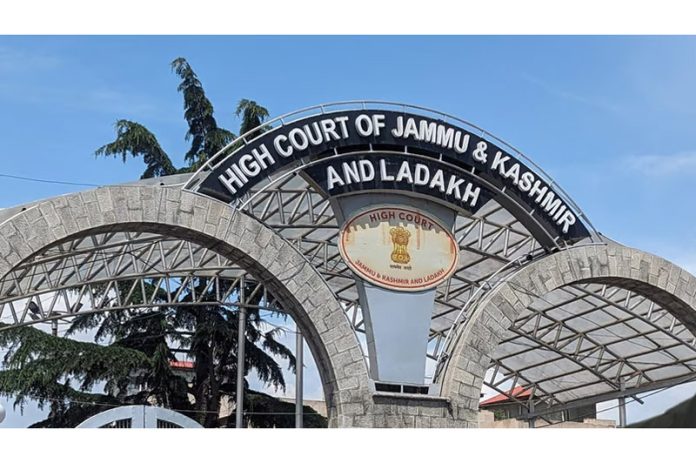Excelsior Correspondent
JAMMU, Oct 23: High Court of Jammu & Kashmir and Ladakh has held that Army Welfare Education Society (AWES) doesn’t qualify as a “State” and its relationship with its teachers constitutes a private contract that cannot be enforced through writ jurisdiction under Article 226 of the Constitution of India.
The bench of Justice Wasim Sadiq Nargal was dealing with a petition seeking quashment of Article 132(B) and 132(C) of AWES Rules and Regulations for Army Public Schools, often known as the Red Book, for allegedly being violative of the principal of natural justice and being arbitrary powers, which hit the fundamental rights of an individual and quashment of termination order of the petitioners issued by Army Public School Udhampur.
After hearing both the sides, Justice Nargal delineated main concerns which necessitated the court’s consideration like does the Army Welfare Education Society qualify as a “State” as defined in Article 12, thereby allowing for a writ to be filed under Article 226 of the Constitution of India; can the private contract between AWES and the teachers be enforced by writ jurisdiction and were the respondents justified in terminating the petitioners services given the unique facts and circumstances of the case, particularly in light of the absence of any adverse findings against the petitioners.
About the maintainability of the petition, High Court said, “while a private educational institution’s role in delivering education may be perceived as a public function, the relationship between the institution’s administration and its employees is contractual, governed by private law, and therefore not subject to writ jurisdiction”.
“The schools bear the obligation to deliver educational services that serve the public good. Nonetheless, in the context of employment disputes or internal affairs, the public dimension may be irrelevant, as these issues are confined to private contractual relationships rather than public responsibilities”, High Court further said.
Pointing towards Chapter 1, Rule 4 of the AWES Rules and Regulations, High Court said, “these Rules explicitly indicate that AWES is not classified as a public entity and has responsibilities exclusively to its members”, adding “it is neither a statutory entity nor its relationships are governed by any statute. The employment contracts between AWES, its educational institutions, and their employees are not governed by public law. Consequently, AWES and its educational institutions do not meet the criteria of “State” as defined in Article 12 of the Constitution of India”.
High Court further said, “Army Public Schools managed by the Army Welfare Education Society are not subject to State supervision, especially not to any substantial or extensive degree. Moreover, the Government does not offer financial support; rather, the institutions are financed through interest from corpus grants, tuition fees, additional fees, contributions and diverse income streams. Consequently, these institutions are financially autonomous as such writ is not maintainable against the society”.
About whether the private contract between AWES and the teachers can be enforced through writ jurisdiction, Justice Nargal said, “judicial review conferred by Article 226 of the Constitution of India empowers the High Court to intervene even in instances where the entity in question is not designated as the State, an authority, or an instrumentality of the State. However, it is imperative that the action under scrutiny possesses a public element for the court to exercise such jurisdiction”.
“Although the respondent aims to deliver education, acknowledged as a public role, the current problem is to the termination of the petitioners services, which is essentially a contractual matter”, High Court said, adding “Apex Court in its recent judgment has held that while a private unaided minority institution may undertake activities that intersect with public functions by fulfilling a public duty, its employees lack the right to invoke the writ jurisdiction of the High Court under Article 226 of the Constitution concerning employment matters not governed by statutory provisions”.
About termination of petitioners, High Court said, “as the writ petition is not maintainable, it cannot examine the merits of this matter. Nevertheless, this court cannot disregard the fact that the petitioners, who are teachers, had an exemplary service record, and one of the petitioners received the best teacher award from the respondents”, adding “in the absence of any adverse report or pending disciplinary inquiry against the petitioners as per Rule 132 (C) of the Army Welfare Education Society Rules and Regulations, what justification did the respondent authorities have for not extending the petitioners probation period or terminating their services without any substantial reasons”.
“This court is not inclined to exercise its inherent jurisdiction under Article 226 as such the petition is dismissed. However, the petitioners can seek redressal of their grievances before appropriate forum”, Justice Nargal concluded.



